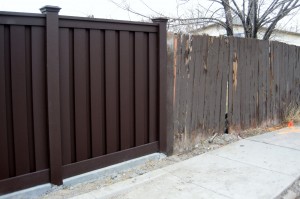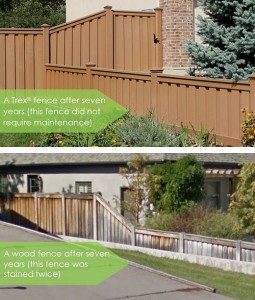Wood Alternative Fencing

Wood fencing degrades over time even with painting or staining. Trex requires much less maintenance throughout its life.
Traditionally, wood has been the product of choice for privacy fence building. It is readily available, generally affordable, and has natural appeal. Wood fencing is also versatile, offering various design options and comes in a variety of species such as cedar, redwood, and pine (treated). Other localized varieties include spruce, fir, and even the occasional hardwood.
While it has its advantages, wood also has its limitations. The most problematic issue is maintenance. The elements (temperature, moisture, sunlight, wind, etc.) affect all products, but wood is quite susceptible to damage. Wood fencing is also prone to termites and other insect damage. Relatively speaking, wood takes a while to degrade, but it inevitably succumbs to the environment around it.
 Because of the limitations of wood, consumers are turning more and more to alternatives. Nothing lasts forever, but wood fencing, particularly that cut from newer growth materials, tends to degrade more quickly than alternatives such as PVC vinyl and composite fencing. Even treated pine or fir can fail more quickly than manufactured materials.
Because of the limitations of wood, consumers are turning more and more to alternatives. Nothing lasts forever, but wood fencing, particularly that cut from newer growth materials, tends to degrade more quickly than alternatives such as PVC vinyl and composite fencing. Even treated pine or fir can fail more quickly than manufactured materials.
The longevity of a wood fence can be extended by maintenance. Usually, that means regular stripping and staining every two to three years, and periodic replacement of insect or rot damaged materials. However, even though it may be inexpensive to install initially, over the course of its lifetime wood fencing can become quite pricey.
Manufactured items are developed as an alternative to wood in a variety of applications such as siding, decking, and fencing. In particular, composite materials are a natural selection because they look the closest to wood and have other material advantages such as strength and durability. As I mentioned, nothing is immune to the effects of weathering. However, composite materials, particularly high caliber products like Trex, are manufactured for long-lasting performance with exceptionally low maintenance. Typically, Trex is a more expensive material than wood, but after several stainings and some repair, wood will surpass the cost of Trex and continue to require the budgeting of maintenance dollars.
For consumers looking for the best alternative to wood privacy fencing, we offer Trex composite fencing. Please visit the rest of our site for more details on this uniquely superior alternative to wood fencing.
